Honda follows up on the Talon with 4-seat options
Less than six months after Honda entered the sport UTV market with the Talon 1000R and 1000X, Honda followed up with two four-seat options. We had our first 2020 Honda Talon 1000X-4 and Talon 1000X-4 Live Valve Driving Impressions in the Nevada desert and share our feedback here.
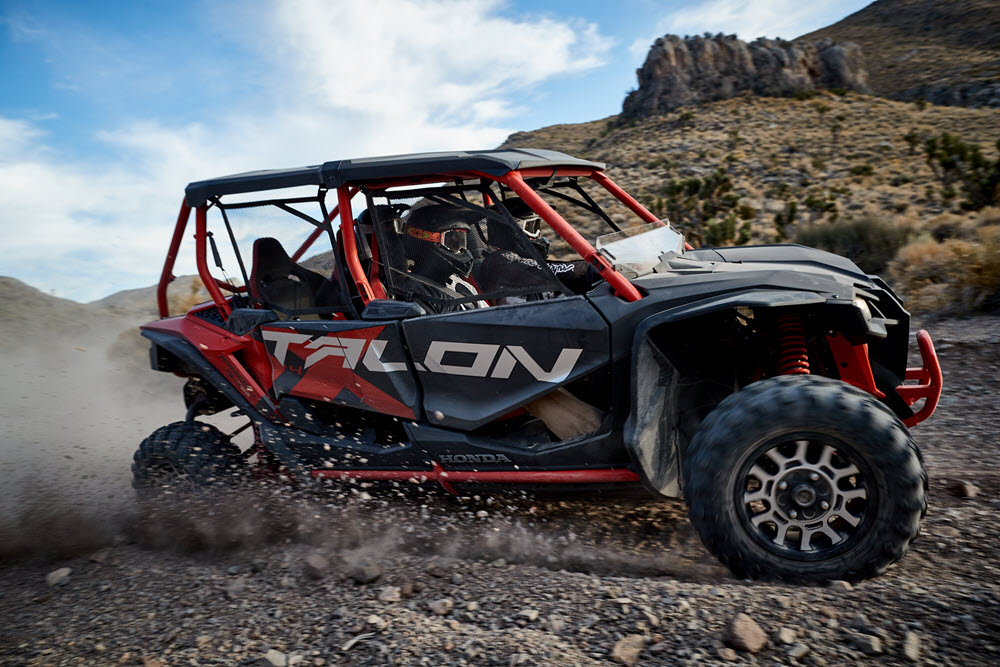
Just a few months after Honda entered the Sport UTV market with the Talon 1000X and Talon 1000R two-seat models, they have released two 4-seat options. Read on for our 2020 Honda Talon 1000X-4 and Talon 1000X-4 Live Valve Driving Impressions.
2020 Honda Talon 1000X-4 Specs
We have spent a lot of time with the 2019 Talon 1000X and 1000R models and feel that they have a lot of strong points that make them a great choice for anybody looking for a sport UTV and the new 4-seaters will also be a good option for a lot of riding terrain. The Talon 1000X-4 shares 88% of the parts with the 2-seat Talon 1000X. Obviously, the new 4-seater uses a longer frame, which extends the wheelbase from 87.6 inches to 116.4 inches, includes the additional seats, doors and a different roll-cage design. But the engine, transmission, suspension components and most other parts are the same with different shock settings to compensate for the change in wheelbase and weight.
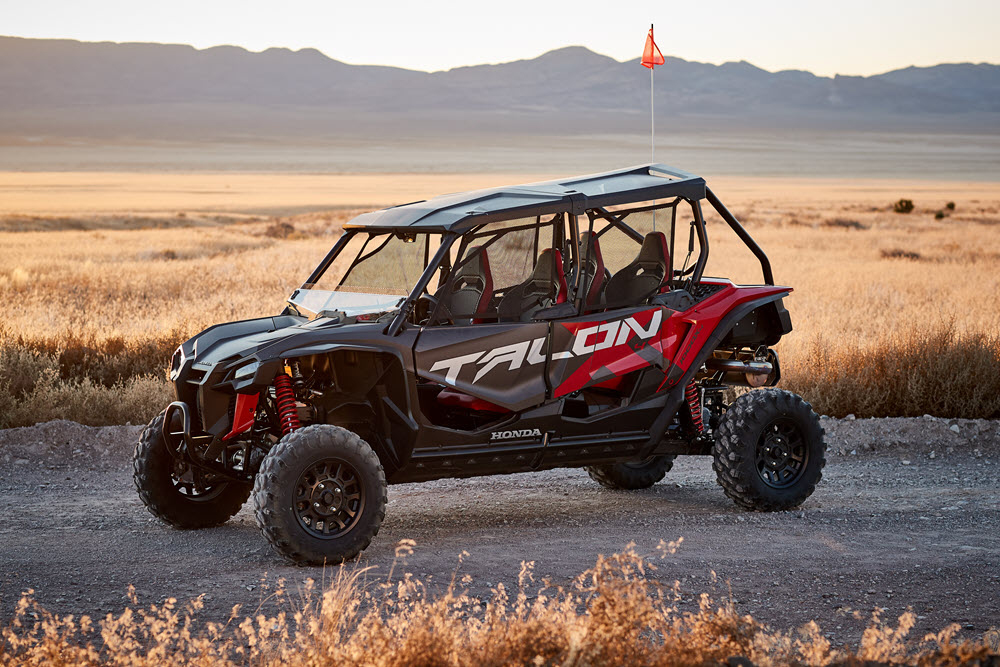
The 2020 Honda Talon 1000X-4 looks great. Like the standard Talon introduced earlier this year, the six-speed automatic DCT transmission is the standout feature. The direct drive system eliminates the weak link of the drive belt.
The six-speed automatic transmission (called DCT) is the biggest differentiating feature of the Talon line of UTV’s. It has a paddle shift option that allows you to override the automatic shifting or if you prefer to select your gears, you can use the paddle shift in manual mode. It is a direct drive system without a belt, which is the system used on most other UTV models. Those drive belts are a weak link that need regular replacement if you drive aggressively and the Talon eliminates this issue. The DCT transmission has proven to be very durable in the standard Talon 2-seaters. Other than a longer front drive shaft and dampening system for the Talon 1000X-4, it is the same driveline.
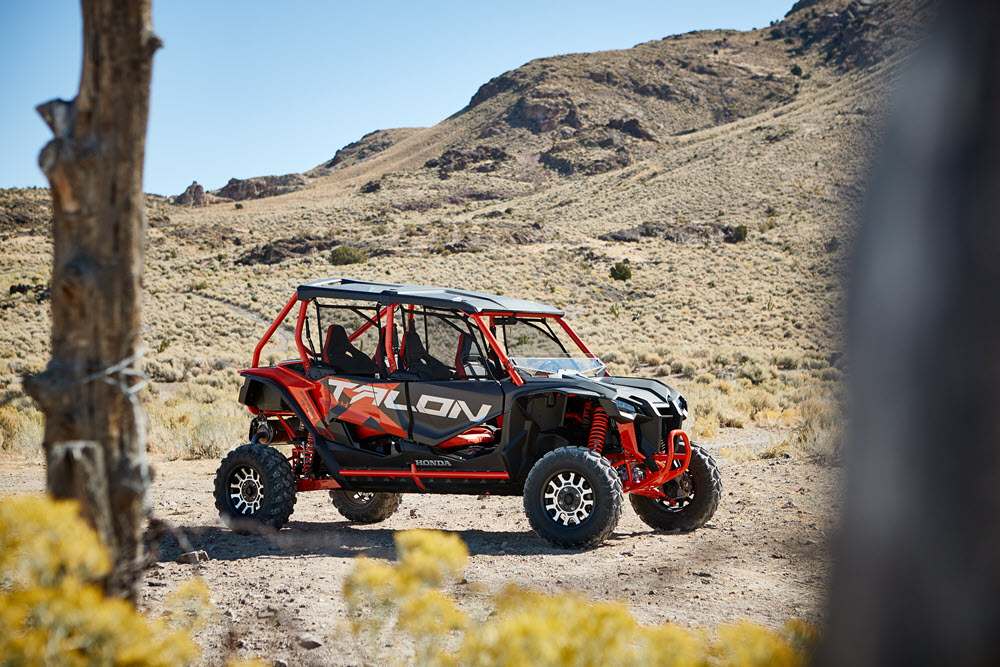
Honda has two versions of their new four-seater and the Talon 1000X-4 Live Valve model includes electronically controlled shocks, a Launch Mode and custom color.
Like the standard Honda Talon 1000X and 1000R, the four-seaters has a 999cc liquid-cooled Unicam, Parallel-twin four-stroke engine with four valves per cylinder. It is fuel injected with 46mm throttle bodies. Honda claims 105 horsepower, and this is in the ballpark with other non-turbo sport UTV’s but that does put it at a disadvantage compared to the Turbo powered Polaris and Can-Am 4-seat options.
With a 64-inch width and 116.4-inch wheelbase, the Talon 1000X-4 is in the same range as the Polaris RZR XP 4 Turbo models. The recently announced RZR PRO XP 4 has a longer 125-inch wheelbase and all the Can-Am Maverick X3 4-seat options have a much longer 135-inch wheelbase. That difference in wheelbase can be an advantage or disadvantage depending on your preferred riding terrain. The Talon 1000X-4 has 14.6-inches of front wheel travel and 15-inches of rear wheel travel, which is as much as five inches less travel than competitive models.
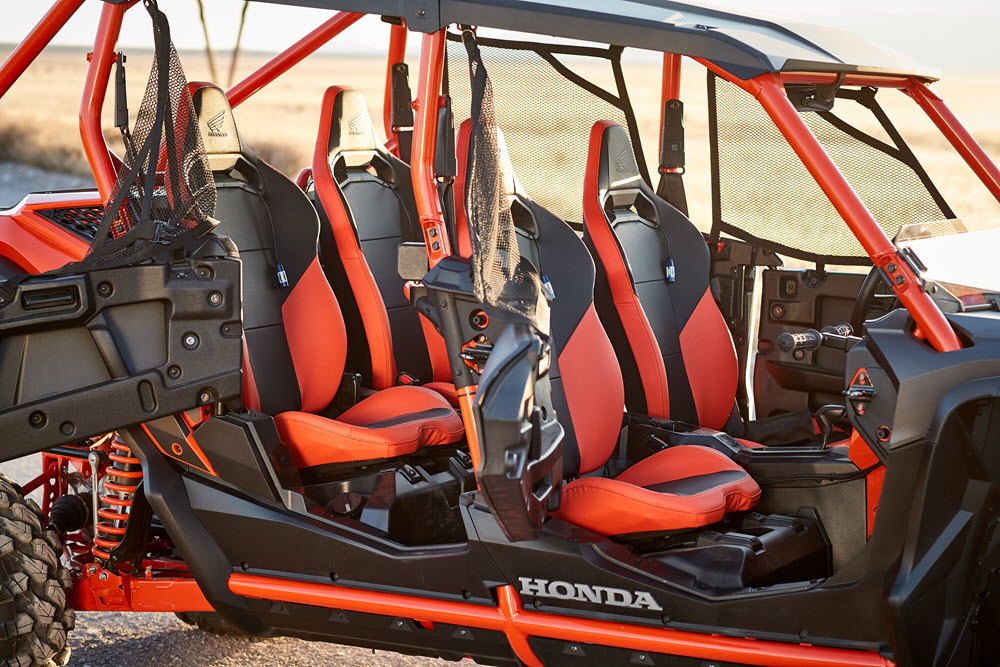
The Talon 1000X-4 and 1000X-4 Live Valve interiors provide fairly roomy rear seats that are comfortable adults up to about 5’ 10”. There is a full-width grab bar in the back.
The 28-inch diameter tires are also the smallest stock tires among the other sport 4-seater options, and this contributes to 12.8 inches of ground clearance, which is also the least among the class. We have run 30-inch tires on a Talon 2-seater with great results. The 7.7-gallon fuel tank is less capacity than the competitors as well but the claimed “wet” (ready to drive) weight of 1735 makes it one of the lightest 4-seat sport UTV’s. With a suggested retail price of $21,999 for the Talon 1000X-4, it is as much as $9,000 less than the other 4-seat sport UTV models so that leaves you some budget for other upgrades.
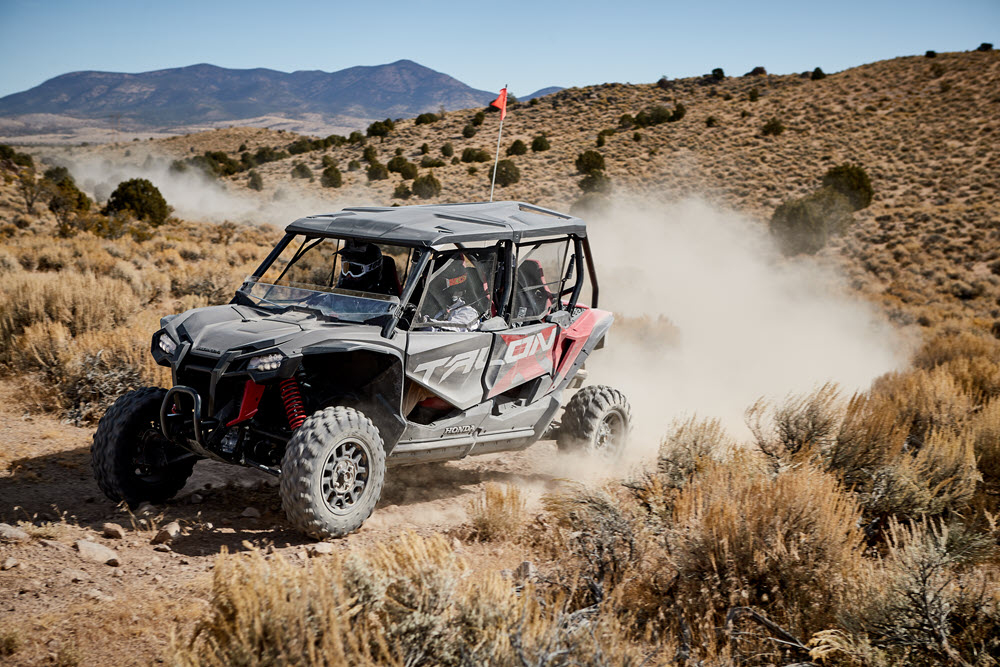
The DCT transmission and direct drive train are the standout features on the Talon Sport UTV line. The I-4 Wheel works really well and tight trails are where this vehicle is at home.
2020 Honda Talon 1000X-4 Driving Impression
Like we noted in our original Honda Talon 1000X and Talon 1000R first driving impressions, we are big fans of the DCT transmission and driveline. The automatic works just about perfectly and you have the option of setting it to standard or sport, which makes it shift a little later for more aggressive driving. We had three different drivers in our vehicle trading off and we all preferred the automatic/sport setting the best. It is really cool to use the paddle shifter to downshift into corners to use the engine braking to help slow down and setup for turns.
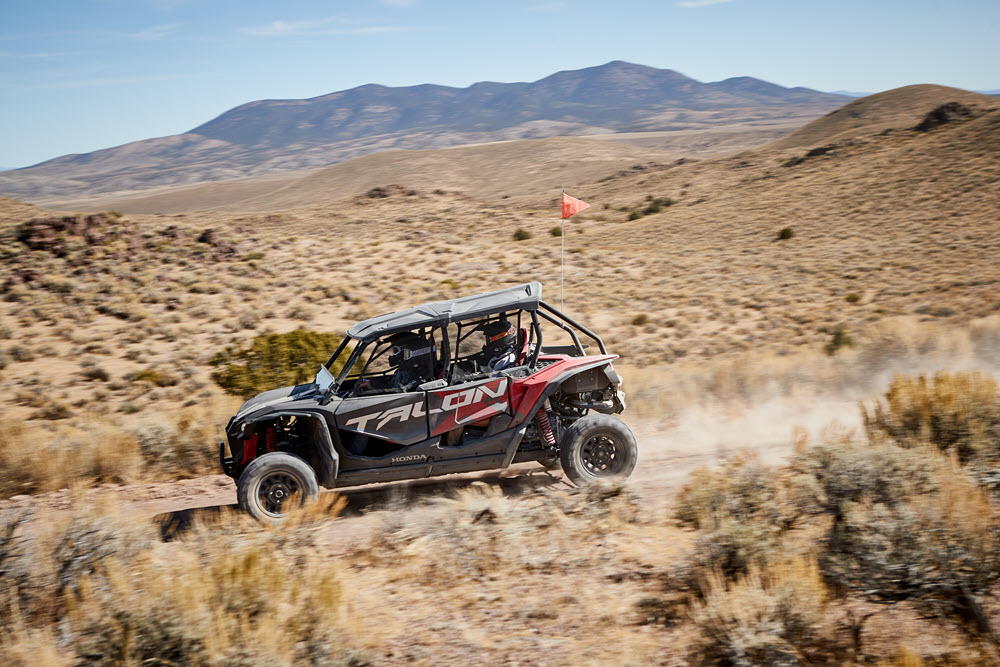
The 2020 Honda Talon 1000X-4 in comfortable for four people, even if those four people are adults.
The I-4WD is great and the Talon 1000-X4 feels very predictable when pushing through almost all types of turns. In fact, it is difficult to get the rear to step out in a corner, even on a flat gravel road, if you are in four-wheel drive. Applying the throttle helps pull the vehicle through the corners. If you do want to switch between 2 and 4-wheel drive, it is easy to do so on the fly with the dash mounted switch. The center mounted display shows you which driving mode you are in, but it is a little difficult to read, especially when you are busy looking at the trail. When it comes time to slow down, the brakes also work very well and provide a lot of confidence.
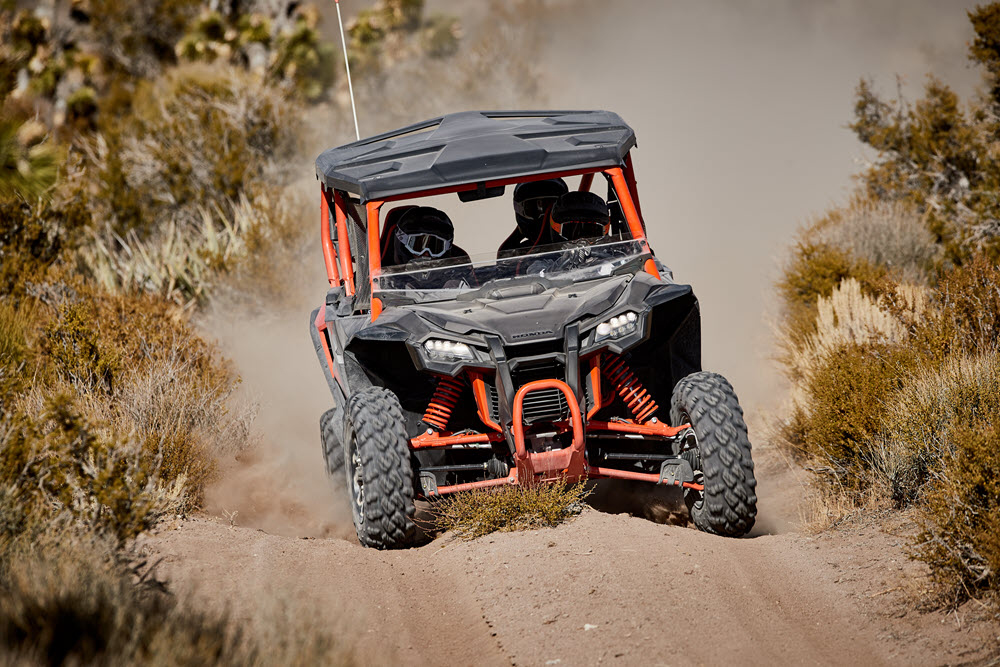
The Talon 1000X-4 Live Valve model provides more stability in the corners and the speed sensitive shocks allow for more aggressive driving in rough terrain. The Launch Mode feature is only available on the Live Valve model and that is a lot of fun for quick take-offs.
The suspension on the Talon 1000-X4 is a little harsh on small bumps, especially when cruising along at a casual pace. If you are going faster, it is less noticeable but still a bit harsh. We always had three-adults in the car and this harshness is more noticeable when riding in the back seat. This is something that we noticed with the two-seat Talon 1000X and 1000R models as well when we have had the opportunity to drive them back to back with other models.
Speaking of riding in the back, the back seats in the Talon 1000-X4 are full-sized so an average sized adult can comfortably ride in the back. They are slightly elevated from the front and positioned closer together than the front seats to help with visibility. The full-width grab bar is also a nice feature.
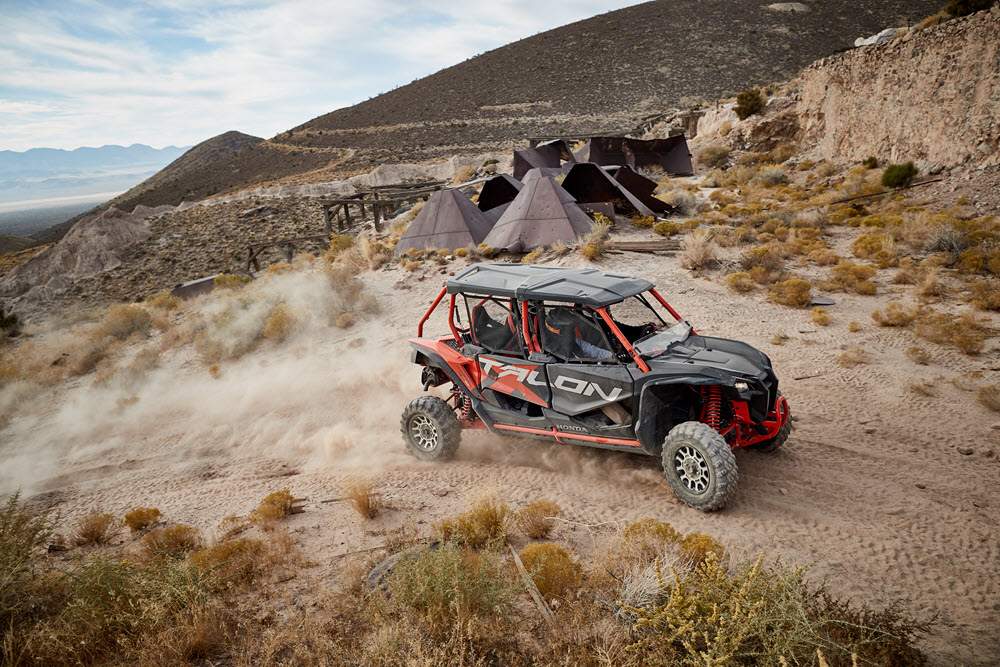
If you are into aggressive driving, you will find that the Live Valve model is worth the additional $2,000.
While we have seen evidence that the direct drive of the Honda Talon is more efficient than the belt drive system used on most of the alternative models, so more of the claimed 105 horsepower is making it to the wheels. However, there is no hiding the fact that the Talon 1000X-4 has less power than all of the other 4-seat sport UTV models. This is not a disadvantage for a lot of terrain but if you want to power up sand dunes or large hills, you will notice the difference if you are racing anybody in on of those turbo models. For the mostly tight Nevada trails that we got to test drive these units on, we did not feel the need for more power and had a blast in those conditions.
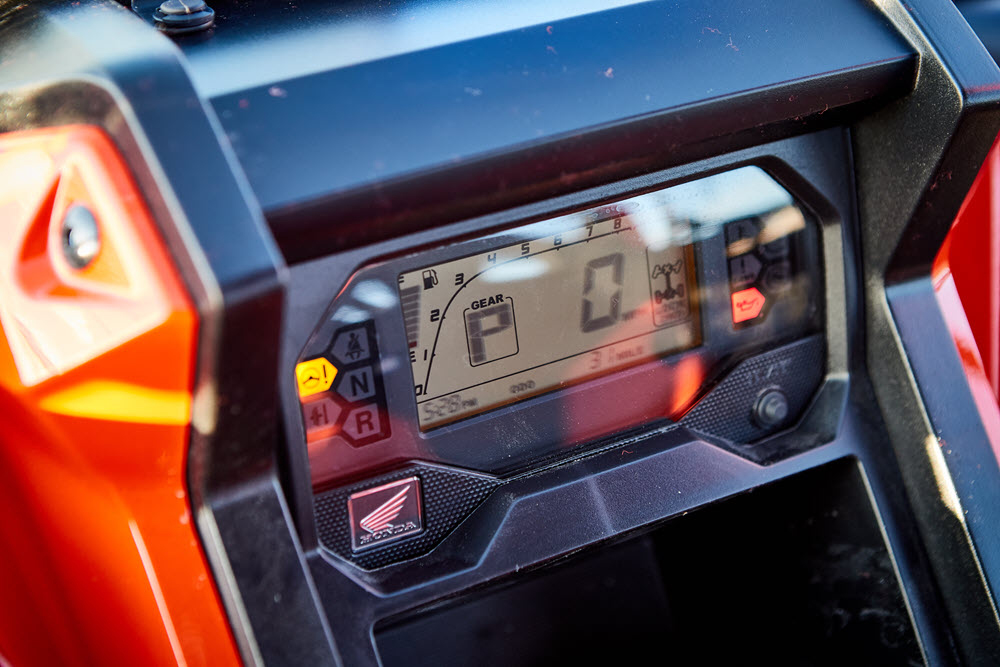
The center mounted dash provides all of the info you could want and the positioning allows the passenger to see this as well, however, it is not easy to see some of the smaller notifications such as the driving mode, I-4WD, etc., especially if it is dusty.
2020 Honda Talon 1000X-4 Live Valve Specs
The Live Valve version of the Talon 1000-X4 has just a few differences from the standard model. The most significant difference is the Fox Live Valve shocks. These shocks are tied into the Talon’s Bosch ECU to independently adjust damping to all four of the 2.5-inch Fox shocks up to 16 times per second. This is designed to provide better bottoming resistance in rough terrain and less body roll while turning. Honda developed the system in conjunction with Bosch and Fox.
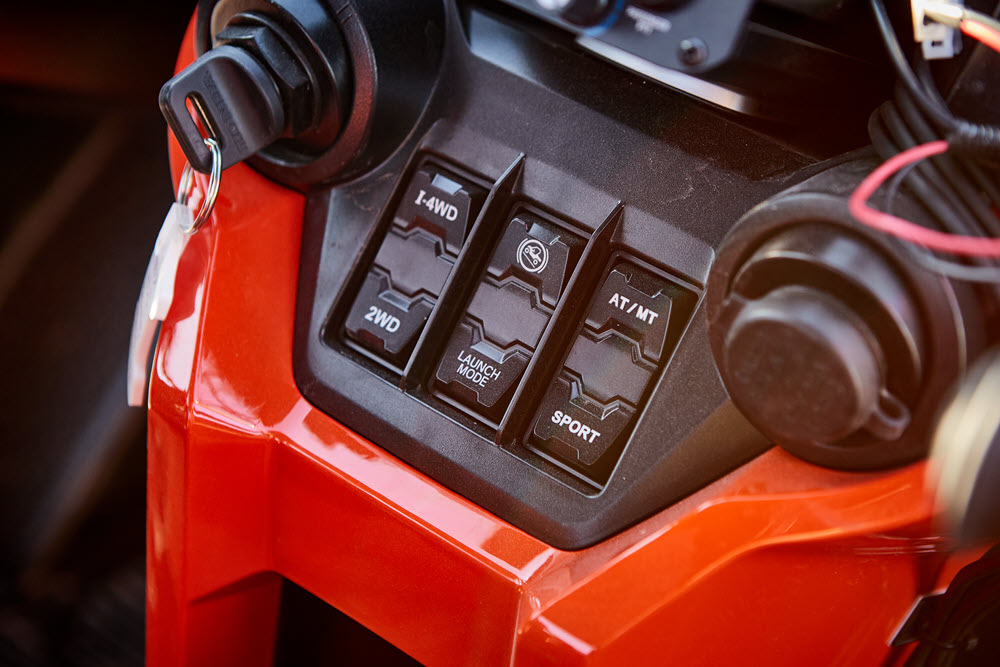
All the important switches are just below the display in the center console, making it easy for the driver or passenger to reach them.
The Live Valve model also includes a Launch Mode. You push a button on the dash, pull back both paddle shifters and it disengages the transmission (like using a manual clutch). This allows you to rev the engine as much as you want, all the way to the rev-limiter like you may have seen with Rally cars. Then you can release both paddle shifters and it launches away from the line. You may ask if this feature can be added to the standard 1000X-4 or the Talon 1000X or Talon 1000R two-seat models and the Honda staff told us that it is currently not possible. So if you want this feature, you will need to pony up for the 1000X-4 Live Valve.
The other differentiating factor for the Live Valve version of the Talon is the metallic grey painted plastic (yes painted as Honda says that is more durable than colored plastic) and orange frame and other matching interior items. Some people loved this look while others preferred the red plastic/black frame on the standard model.
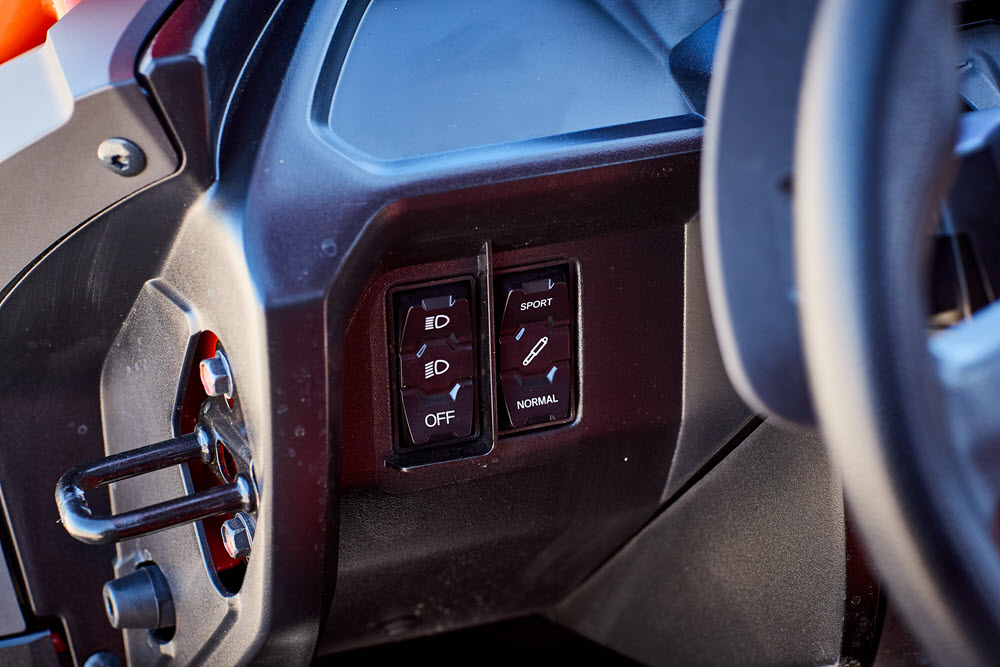
The one difference between the standard Talon 1000X-4 and the 1000X-4 Live Valve is this switch on the left side of the steering wheel that allows you to change the shock settings between Sport and Normal. There is also an indicator lamp just ahead of the steering wheel to let you know which mode you are in and the difference is noticeable.
2020 Honda Talon 1000X-4 Live Valve Driving Impression
As we noted above, we felt that the standard Talon 1000X-4 is a little harsh on small bumps, especially when driving slowly but works pretty well when you push it at a fast pace, even in pretty rough terrain The Live Valve version feels even a little more harshness in that small stuff but pushing it hard is where you can feel the improved performance. Larger hits are absorbed well without blowing through the travel and it has a more planted feeling when corning. The Live Valve has two settings available via a switch on the left-hand side of the steering wheel (Sport and Normal) and it provides a noticeable difference in the ride. Even the “normal” setting feels more controlled than the standard 1000X-4.
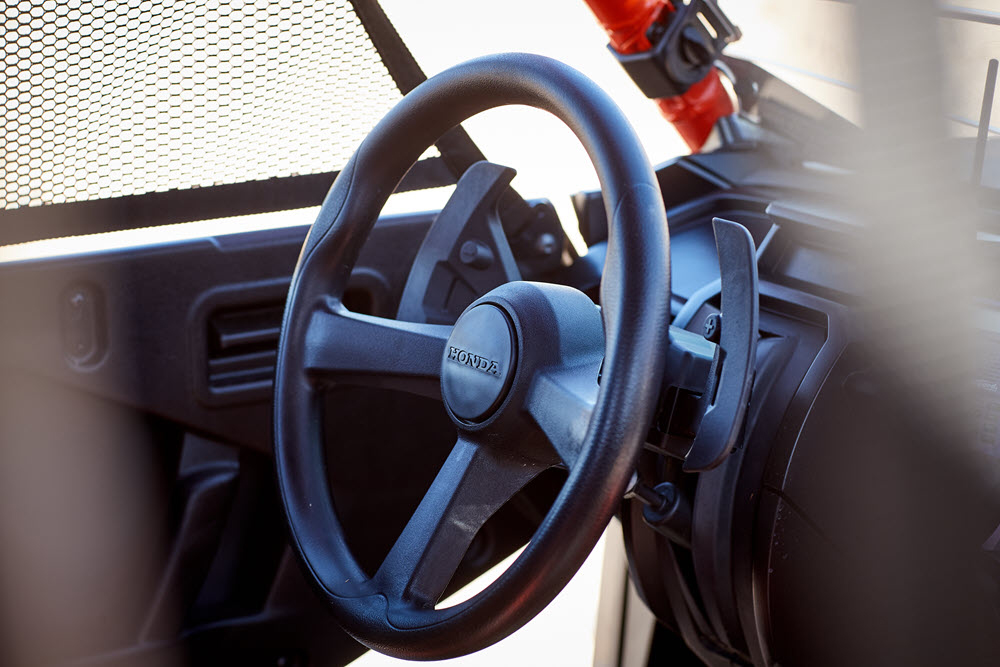
The Talon DCT shifts nearly perfectly in auto so we preferred that setting but still liked using the paddle shift to override the system when needed. This works well to downshift entering corners aggressively.
Our first reaction to the Launch Mode was that it didn’t seem to have much of a practical use. But after doing a few standing starts, we were sold on this feature. It is just cool to rev it up and “drop the clutch” and if you are into drag racing your buddies, you will likely beat them off the line. Unfortunately, if your buddy has one of the competitive Turbo models, they will likely make up that distance pretty quickly.
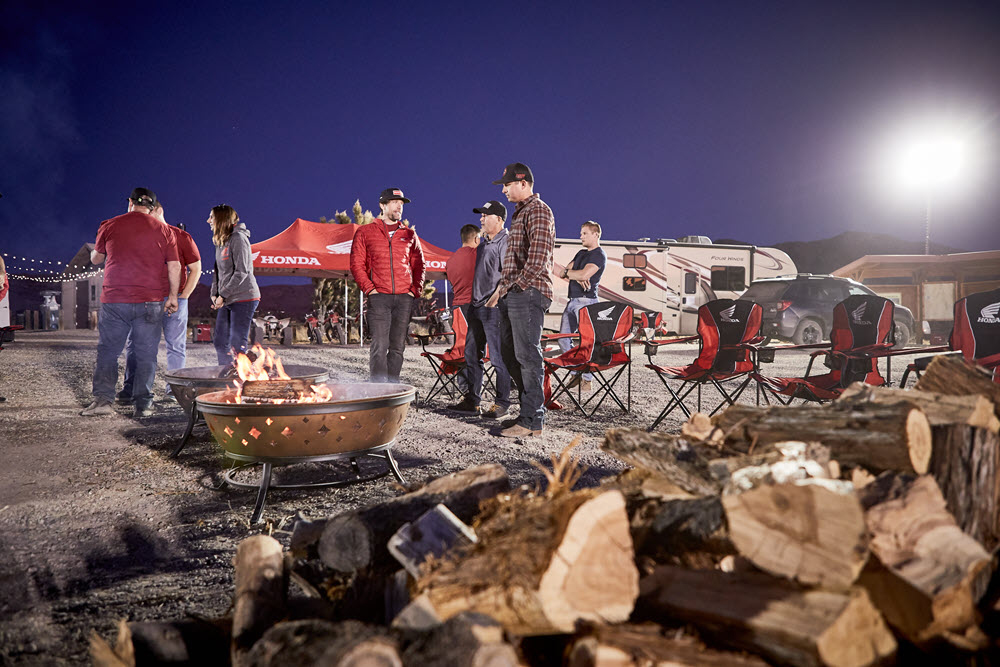
Kudos to Honda for hosting the Honda Talon 1000X-4 intro in Nevada with RV’s to camp out. This is how a lot of people enjoy their UTV’s and it was great to rehash the day around the campfire and talk ride and the vehicles.
With a suggested retail price of $23,999 for the 2020 Honda Talon 1000X-4 Live Valve, it is $2,000 more than the standard Talon 1000X-4. We debated amongst the three of us about if it was worth that extra money for the Live Valve shocks, Launch Mode and custom paint and it was a not clear cut. If you are into driving aggressively, it is worth it and the more we drove it, the more we leaned in that direction.

Adding to the enjoyment of the trip, Honda had multi-time Baja and desert racing champion Scot Harden create the routes and on hand to discuss the Nevada desert that we were enjoying.
Honda Talon 1000X-4 Accessories
Because the Talon 1000X-4 shares so many parts with the Talon 1000X, the large list of genuine Honda accessories made for that vehicle fit the new four-seater options as well. Plus, Honda has created some specific products for the Talon 1000X-4 as well, including doors, nerf bars, and full-length skid plates. Most of the aftermarket accessories will also fit.
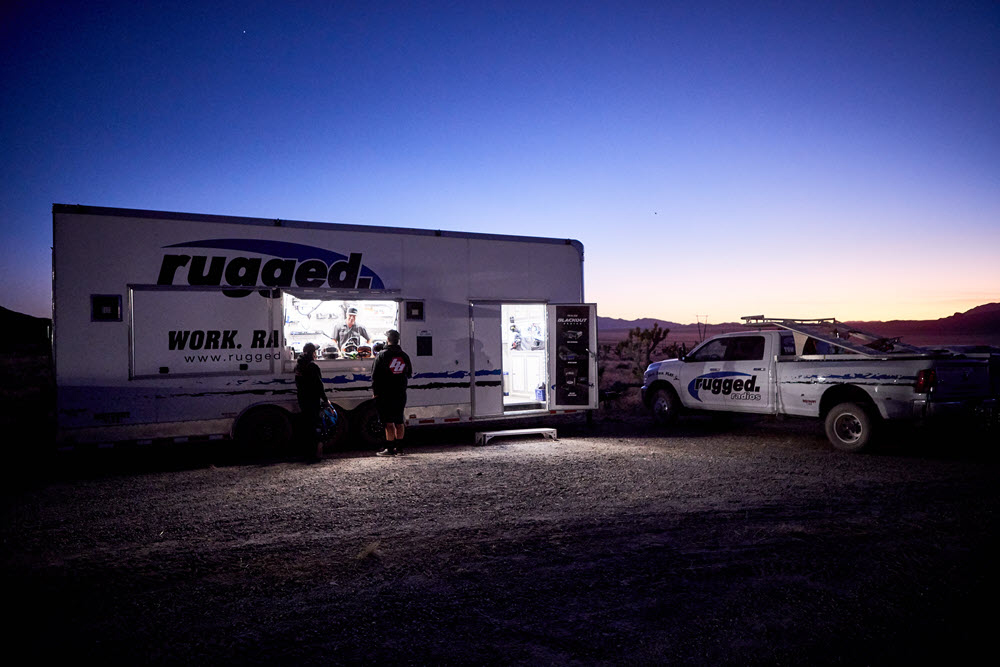
Rugged Radios was on hand to install communications systems in all of the Talon’s and attendees’ helmets. The in-car and car-to-car communication really helped the group navigate the routes and point out features along the way.
Conclusion
The Honda Talon 1000X-4 and 1000X-4 Live Valve models have a lot of great features that make either option a great choice for anybody in the market for a sport UTV. Like the standard Talon, the DCT transmission and drivetrain is the standout feature as it is fun to drive and eliminates the drive belt. The Talon 1000X-4 and 1000X-4 Live Valve versions performs really well in tight terrain and they are plenty fast to have fun in the right conditions. If you are looking for pure speed, all the competitive models have turbo powered engines that produce more power but if that is not your priority, the Honda will be a great choice.
2020 1000 Sport UTV 4-Seater Specs comparison
| Width | Wheelbase | Front Suspension Travel | Rear Suspension Travel | Drivetrain | Engine | Claimed Horsepower | |
| Honda Talon 1000X-4 Live Valve | 64.0 Inches | 116.4 Inches | 14.4 Inches | 15.0 Inches | 6-Speed Automatic DCT with Manual Option | 999cc Twin Cylinder | 105 |
| Honda Talon 1000X-4 | 64.0 Inches | 116.4 Inches | 14.6 Inches | 15.0 Inches | 6-Speed Automatic DCT with Manual Option | 999cc Twin Cylinder | 105 |
| Polaris RZR PRO XP 4 | 64.0 Inches | 125.0 Inches | 17.0 Inches | 20.0 Inches | CVT Belt Drive | 925cc Twin Cylinder Turbo | 181 |
| Polaris RZR XP 4 Turbo | 64.0 Inches | 117.0 Inches | 16.0 Inches | 18.0 Inches | CVT Belt Drive | 925cc Twin Cylinder Turbo | 168 |
| Polaris RZR XP 4 Turbo S | 72.0 Inches | 117.0 Inches | 16.0 Inches | 21.0 Inches | CVT Belt Drive | 925cc Twin Cylinder Turbo | 168 |
| Can-Am Maverick X3 Max Turbo | 64.0 Inches | 135.0 Inches | 20.0 Inches | 20.0 Inches | CVT Belt Drive | 900cc Three Cylinder Turbo | 120 |
| Can-Am Maverick X3 Max DS Turbo R | 64.0 Inches | 135.0 Inches | 22.0 Inches | 22.0 Inches | CVT Belt Drive | 900cc Three Cylinder Turbo | 172 |
| Can-Am Maverick X3 Max RS Turbo R | 72.4 Inches | 135.0 Inches | 20.0 Inches | 20.0 Inches | CVT Belt Drive | 900cc Three Cylinder Turbo | 172 |
| Can-Am Maverick X3 Max X DS Turbo RR | 64.0 Inches | 135.0 Inches | 20.0 Inches | 20.0 Inches | CVT Belt Drive | 900cc Three Cylinder Turbo | 195 |
| Can-Am Maverick X3 Max X RS Turbo RR | 72.4 Inches | 135.0 Inches | 22.0 Inches | 22.0 Inches | CVT Belt Drive | 900cc Three Cylinder Turbo | 195 |
| Can-Am Maverick X3 Max X MR Turbo RR | 72.4 Inches | 135.0 Inches | 22.0 Inches | 22.0 Inches | CVT Belt Drive | 900cc Three Cylinder Turbo | 195 |
| MSRP | Claimed Weight | Turning Radius | Fuel Capacity | Ground Clearance | Tire Size | Wheel Diameter | |
| Honda Talon 1000X-4 Live Valve | $23,999 | 1735 lbs (wet) | 21.3 ft | 7.7 gal | 12.8 Inches | 28 Inches | 15 Inches |
| Honda Talon 1000X-4 | $21,999 | 1735 lbs (wet) | 21.3 ft | 7.7 gal | 12.8 Inches | 28 Inches | 15 Inches |
| Polaris RZR PRO XP 4 | $25,699 | 2026 lbs (dry) | 21.7 ft | 13.0 gal | 14.5 Inches | 30 Inches | 14 Inches |
| Polaris RZR XP 4 Turbo | $23,699 | 1990 lbs (dry) | NA | 9.5 gal | 14.0 Inches | 29 Inches | 14 Inches |
| Polaris RZR XP 4 Turbo S | $30,999 | 1990 lbs (dry) | NA | 9.5 gal | 16.0 Inches | 29 Inches | 14 Inches |
| Can-Am Maverick X3 Max Turbo | $21,999 | 1726 lbs (dry) | NA | 10.5 gal | 13.0 Inches | 28 Inches | 14 Inches |
| Can-Am Maverick X3 Max DS Turbo R | $23,699 | 1726 lbs (dry) | NA | 10.5 gal | 13.0 Inches | 28 Inches | 14 Inches |
| Can-Am Maverick X3 Max RS Turbo R | $25,199 | 1869 lbs (dry) | NA | 10.5 gal | 15.5 Inches | 29 Inches | 14 Inches |
| Can-Am Maverick X3 Max X DS Turbo RR | $27,499 | 1766 lbs (dry) | NA | 10.5 gal | 13.0 Inches | 29 Inches | 14 Inches |
| Can-Am Maverick X3 Max X RS Turbo RR | $29,999 | 1858 lbs (dry) | NA | 10.5 gal | 16.0 Inches | 30 Inches | 14 Inches |
| Can-Am Maverick X3 Max X MR Turbo RR | $28,899 | 1940 lbs (dry) | NA | 10.5 gal | 16.0 Inches | 30 Inches | 14 Inches |
COMPANY DETAILS |
 |
|
Company |
Honda Powersports |
|
Website |
|
|
Connect |
    |
|
|
  |
|
Contact |
|
|
Phone |
(866) 784-1870 |
|
Address |
P.O. Box 2200 |
| Torrance, CA 90509-2200 |
ABOUT Honda Powersports®
American Honda Motor Co., Inc., is the sole distributor of Honda motorcycles, scooters, ATVs and Side-by-Sides in the U.S. Founded in 1948 in Hamamatsu, Japan, Honda opened its first U.S. storefront in Los Angeles, CA, in 1959. Honda has the longest sustained U.S. manufacturing presence of any international automaker.
